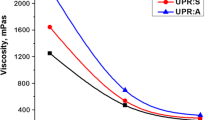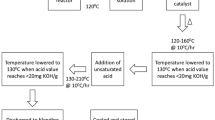Abstract
Recycling of polyethyleneterephthalate (PET) bottles for soft drinks is accomplished by depolymerization through glycolysis. Obtained intermediates are reacted with mixtures of saturated and unsaturated acids to obtain unsaturated polyesters (UP) suitable for use as a matrix for fibre-reinforced thermosetting composites. The influence of chemical structure of glycols on the chemo-rheological behaviour of resins, has been verified. By using di-ethylene glycol, the behaviour of the resulting UP closely resembles that of UP obtained from virgin monomers. Moreover, composite sheets containing UP developed in the present research, show enhanced toughness if compared with the analogous composite made of virgin UP resin.
Similar content being viewed by others
Author information
Authors and Affiliations
Rights and permissions
About this article
Cite this article
Aslan, S., Immirzi, B., Laurienzo, P. et al. Unsaturated polyester resins from glycolysed waste polyethyleneterephthalate: synthesis and comparison of properties and performance with virgin resin. Journal of Materials Science 32, 2329–2336 (1997). https://doi.org/10.1023/A:1018584519173
Issue Date:
DOI: https://doi.org/10.1023/A:1018584519173




